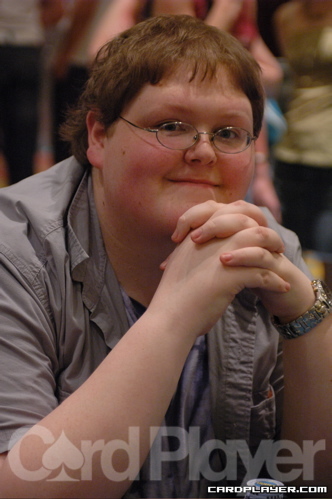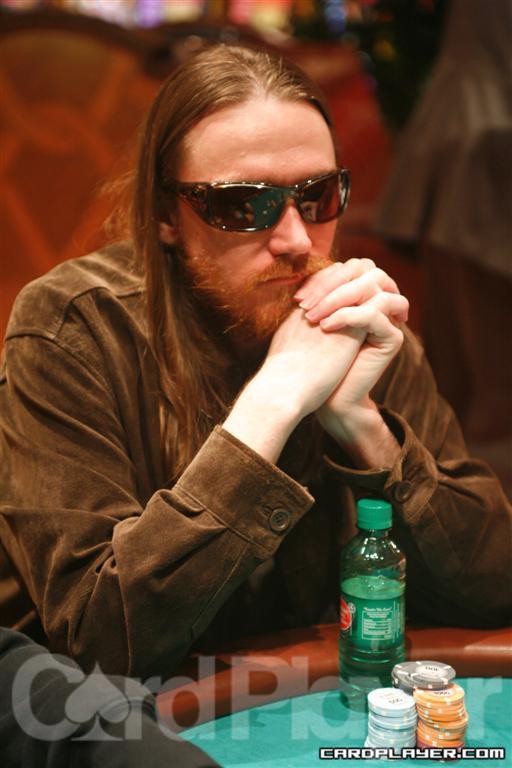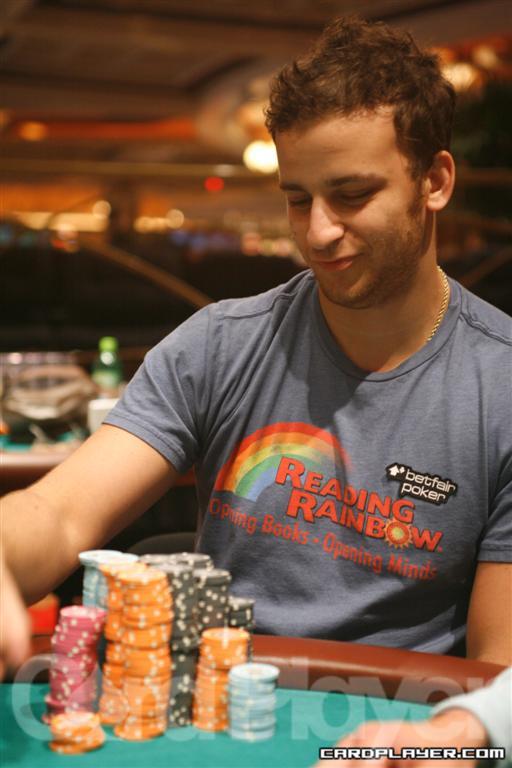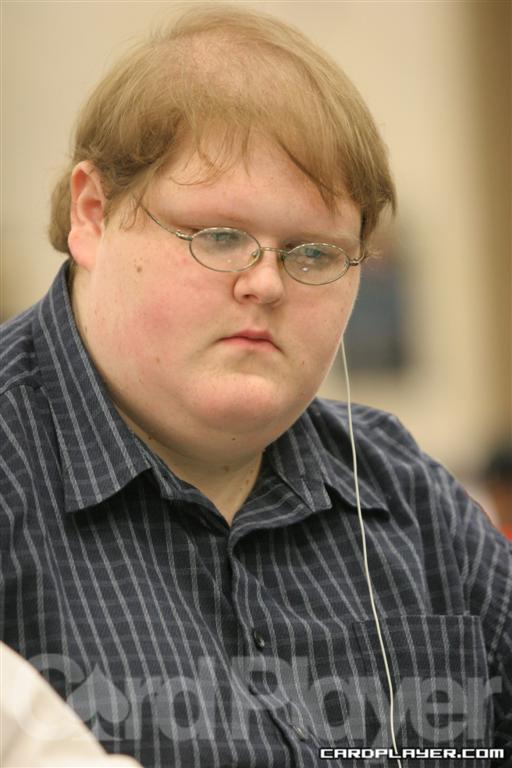






Jimmy Fricke -- What's My Line?Fricke's Thought Process On Calling a Bluff From Sorel Mizzi |
|
|
 One of the most likeable, yet feared players on the tournament circuit is 22-year-old Jimmy Fricke. The former Mahomet, Illinois, resident dropped out of college at the age of 18 to focus on his online career, playing as gobboboy. After turning 19, Fricke began to concentrate on the live-poker scene and pocketed $800,000 for his runner-up finish in the 2007 Aussie Millions main event. At the 2008 Bellagio Cup IV, Fricke won a $5,000 event for $443,155. Since turning pro, Fricke has earned nearly $1.5 million.
One of the most likeable, yet feared players on the tournament circuit is 22-year-old Jimmy Fricke. The former Mahomet, Illinois, resident dropped out of college at the age of 18 to focus on his online career, playing as gobboboy. After turning 19, Fricke began to concentrate on the live-poker scene and pocketed $800,000 for his runner-up finish in the 2007 Aussie Millions main event. At the 2008 Bellagio Cup IV, Fricke won a $5,000 event for $443,155. Since turning pro, Fricke has earned nearly $1.5 million.
Recently, Fricke competed in the Wynn Classic $10,000 main event and finished in 11th place. During the play-down just before the money bubble, Fricke played a pot with Sorel Mizzi which perfectly illustrates his thought process when deciding whether or not to call what he believes is a bluff.
| Event - Blinds/Antes | Wynn Classic | 800-1,600 with a 200 ante | |
| Player | Shawn Glines | Sorel Mizzi | Jimmy Fricke |
| Chip Count | About 55,000 | About 235,000 | About 170,000 |
| Hand | K-J | ? | Q-10 |
The Hand
Shawn Glines raised to 4,200 on the button, and both Jimmy Fricke and Sorel Mizzi called in the blinds. The flop came out Q-J-3, and Fricke bet 8,500.
Mizzi and Glines both made the call, and the turn was an ace. Fricke checked, Mizzi bet 25,500, and Glines folded. Fricke made the call, and the river paired the board with another trey.
Fricke checked, and Mizzi bet 40,000. After some thought, Fricke made the call and showed Q-10 for second pair. Mizzi tapped the table and mucked his hand.
The Interview

Jimmy Fricke: Sure. Shawn Glines (pictured left) raised to 4,200 on the button, and I had Q-10 in the small blind. The thing about Shawn is that he plays pretty straight-forwardly, he’s definitely not bad, but I feel like I can exploit him in a lot of spots. So, I don’t think calling with Q-10 from out of position is necessarily a bad play. Against a really good, tricky player, I would probably either fold or three-bet a large percentage of the time.
JR: Were you worried at all about Sorel behind you in the big blind?
JF: I do think Sorel would three-bet with a decent amount of frequency, but I know that he also likes to call a lot. At this table, however, it seemed that for some reason he was trying to target the good players and wasn’t really messing with the bad players. So, I call, and he decides to call, as well.
The flop came down Q-J-3. This is a spot where if I check, Sorel is probably going to check, and if Shawn bets, I don’t really want to put in a check-raise, because it pretty much crushes Sorel’s range behind me. Not to mention that Shawn is going to check behind a lot of the time because this flop hits our cold-calling range quite a bit.
JR: Did Shawn’s short stack factor into your decision at all?
JF: Shawn opens the button very lightly, and he only had about 50,000 behind, so I was fully committed to getting it in against him. I played with him deep in a $2K event before, and if I remember correctly, he was opening the button around 90 percent of the time, which is fine. He should be doing that, but when a player makes a habit out of that, you can’t give up a hand as strong as two Broadway cards.
So, anyway, I decide to lead out for 8,500, and Sorel calls. I wasn’t quite expecting that, but I still feel like I had the best hand most of the time, unless he had a hand like K-Q or maybe even Q-J. The problem with those holdings is that I think he’d raise, trying to get Shawn out behind him to get it heads up and keep position over me.

The turn is an ace, putting two spades on board. It isn’t a great card, but I really don’t think it hits their ranges very well, either, unless one of them has A-J. So, I check, and Sorel bets 25,500. Shawn quickly folds.
JR: What do you think Shawn held?
JF: He actually told me afterwards that he had K-J, which I believe. K-J makes perfect sense. Shawn definitely understands the dynamic between Sorel and I, knowing we were going at it a lot, and he was trying to take advantage of that.
JR: What do you think about Sorel’s hand at this point?
JF: I still kind of feel like he has a queen here, maybe he’s semi-bluffing with it. K-10 is really the only thing I’m afraid of here, unless he has exactly A-J.
I decided to call, and the river was another 3. That’s a good and bad card for me. It’s good because now I chop the pot if he had me beat with K-Q. But, of course, the opposite is true where I chop with a worse queen. A lot of the time in this spot, I expect it to go check-check, and he shows me something like Q-9. So, now I have to share half of the pot with a worse queen, as well.
JR: Instead, you checked, and he bet.
JF: Right, he bet 40,000. I just feel like he should be checking behind here with most of his hands. He has to have a pretty specific hand in order to bet the river, and that is K-10 or A-J. I thought there were plenty of hands I was chopping with, and plenty of hands I could win the pot outright with, so I made the call. He tapped the table and mucked, and I took in the pot.

JF: I think he called me pretty light on the flop. He could have had 10-9, but it’s also possible that he turned a jack into a bluff. He could have had J-10 or something like that.
JR: It seemed to me that he really didn’t want to go to a showdown, and after you made the call, he really didn’t want to show his hand. Doesn’t that rule out a paired hand with showdown value like J-10?
JF: Maybe. He could have definitely had a hand like 10-8 or 10-9 and missed entirely, but I also think he would’ve known his jack was no good once I made the call, which would explain why he was avoiding turning his hand up.
Keep in mind, I called this bluff and won the pot, but half an hour later I called another one of his river “bluffs” and he showed me the nuts. I know it sounds weird and really results-oriented, but I can tell the difference in my mind between my good calls and the calls I make where it’s like, “Screw it, I just want to win this pot.” I can justify this particular call with this hand analysis knowing there was a concrete reason for calling. In the later hand, where Sorel showed me the nuts, my mistake was that I was calling out of frustration and stubbornness. That’s the key for players to understand. You need to be calling because a series of events lead you to believe you may have the best hand. You can’t just randomly call to satisfy your curiosity.
